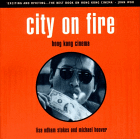

Though the book certainly covers a great deal of territory from Woo to Wong Kar Wai and much in between, the book is in no sense an overview of HK film. If the reader were unfamiliar with HK cinema, I don’t think they would have a clear picture of what HK film is all about by the time they finished this. In fact they might feel very confused as very little of this is tied together.
There are many points of information – but to a large extent they are not connected within the context of a holistic view of HK cinema - but only connected up by their theories of HK film. For the most part, the authors don't even try to inform the reader as to the relative importance of the films or directors or actors they discuss and what their significance is in HK cinema. For example - Peking Opera Blues (a major classic) is given much less space than Donnie Yen's Ballistic Kiss. A reader could come away with the impression that Ballistic Kiss is a major milestone in HK film while Peking Opera Blues is just another film and it is just the opposite. But an overview of HK film was clearly not the authors’ intention.
What Stokes/Hoover have set out to do is to interpret HK films through the prism of two specific theories and the films they choose to discuss are the ones that they believe fit neatly into these theories. The films themselves are rarely even judged in critical terms; they are simply used as a device to reinforce their viewpoint.
The main thrust of the book is that the amazing burst of creative filmmaking that took off in the mid 1980s was to a large degree caused by the looming 1997 Handover of HK to China. The fears and concerns that these filmmakers had regarding the Handover and their potential loss of artistic freedom drove them to a heightened creativity and activity. Many of the films over this period reflect this according to Stokes/Hoover either directly or more often in the subtext of the film. There is no doubt that the Handover was of grave concern to many filmmakers, but how much this impacted their films is another matter and it often struck me that the authors were reaching when they interpreted the subtext of many films. Sometimes though – as with Wong Kar Wai’s films I found it quite perceptive. Still though, there were many other reasons – social, economical and personal – for this incredibly creative period that the authors generally ignore.
The second thread that weaves through the book leaves me completely baffled as to the intent of the authors. On a continuous basis Marx (Karl I am afraid – not Groucho) is quoted to make a point about a film. But to what purpose? For example, while writing about Woo’s A Better Tomorrow and the villain Shing - Marx is quoted to describe Shing as “only lives by sucking living labour, and lives the more, the more labor it sucks” or regarding Mad Dog from Hard Boiled – “I kill whoever’s in my way,’ he smirks. As Marx puts it. “One Capitalist always kills many”. Ya – OK – but so what. They leave no doubt as to their own politics, but are they trying to imply that Marxist thought has influenced Woo. I don’t think so. Are they trying to imply that the "dog eat dog" economy of HK influenced films – perhaps - but then just say that. I can see absolutely no purpose to these quotes except to express their own political leanings and erudition. It has nothing to do with HK film.
Those are the negatives. There are certainly some positive things regarding this book. A great deal of research has gone into it and it is filled with a huge amount of information – much of it was very new to me and much of it quite interesting. Their coverage of many films is very in-depth – almost too much at times – but I often found their analysis intriguing. In particular I enjoyed their writings on Woo, Ringo Lam and Wong Kar Wai (by ignoring the Marxist references).
Again, I don’t think this is a book for those with only a beginning knowledge of HK films or for those that are primarily interested in specific genres of HK film (ie action). I think it could be an interesting read to those well versed in HK film - take what you can from this book and see what you think regarding the author’s interpretation of HK film.
If anyone has any comments that they would
like to add to this – I would be glad to add them here.